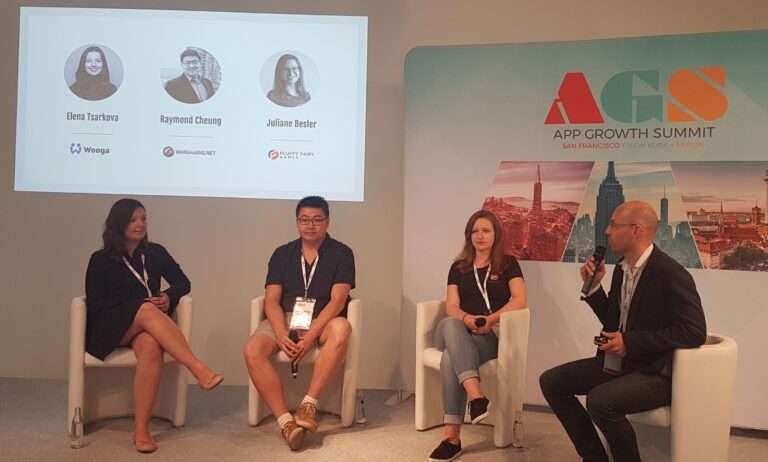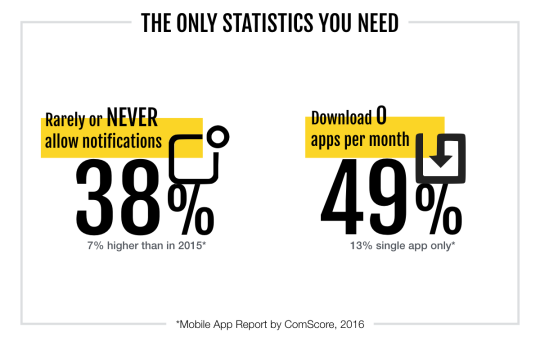An interview for gaming magazine Level published in July 2012 with some updated facts.
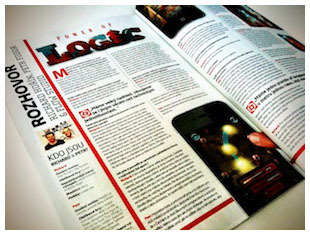
Slick office building in Prague houses so called “technology accelerator” . Do not expect white coat scientists or vibrating subatomic particles. Business thrives here. Techsquare is a home for many important Czech startups, emerging Czech technological companies. Flow Studio, led by Richard Horin (39) and Petr Fodor (31), is one of them. They successfully published their first iOS game, Power of Logic, at the end of the last year and are working on another project.
What brought you to the field of game development?
Richard: I spent 15 years in an advertising agency, Petr spent a bit less there. Such job makes you tired after some time. We realized that we have spent time doing a boring job. That’s how we decided for a big mind-switch.
So you haven’t had any game development experience before?
Richard: Of course we have been playing games since childhood, we were monitoring mobile gaming recently, but we have never actually tried the development. The whole crazy idea came last Christmas. I said to myself: screw this, I’m gonna do what I enjoy and fulfill my childhood dream. It had something to do with the massive mobile gaming market development as well. Gaming devices are becoming common with the people. So, if you want to start, it is better with mobile platforms. I asked Petr whether he would be able to go through this change with me. We had quit the agency, where we had very lucrative jobs, and stepped into uncertainty. We do what we 100% love. We used to look forward to the weekend, now we look forward for Monday.
How did you cope with building the company, hiring people, etc.?
Richard: That’s where we do have a lot of experience. Building a company in the legislature point of view is easy. Looking for talent, analyzing who will be good to cooperate with or who is talented, but working on a project with him is a suicide – that’s where we do have many years of experience. We might be a little older than expected, but that’s why we have a lot of experience in pragmatic business. These experiences stay with us and make us more careful, not so headless.
Petr: Our hypothesis, which we did confirm during a few first months of careful game business monitoring, was that there are many skilled programmers and graphical designers in the Czech Republic. They often lack strategy however. I mean, what do we do, how do we make it so that people like it, to make it salable. We built our idea upon this. Neither Richard nor I are coders. Our strength lies elsewhere: we’re able to manage a programmer or a graphic designer thanks to extensive experience we had with large projects involving tens of people. After the year, we know our hypothesis was right. We have broad perspective, we work on other things than technical details. We believe these things are what decides about the success of the game. Let me exaggerate: today, anyone can code. To make the game really good, funny, to reach the people, that´s where most Czech developers often fail.
When you started, did you have a clear idea of your first game, some more detailed plan?
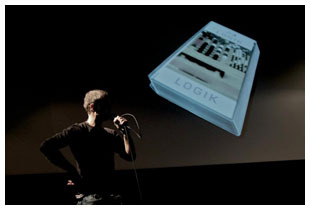 Richard: Sure, we had the plan ready. We intentionally opted for very simple game, a toy maybe. One that is commonly known, I personally knew it from my childhood. We worked with the fact that people know it and can talk about it. It is also simple and easy – from the user and developer point of view. There were not many technical problems, so we were able to manage it and publish it eventually. I know a lot of projects with great plans and ambitions… what counts in the end, however, is the released game.
Richard: Sure, we had the plan ready. We intentionally opted for very simple game, a toy maybe. One that is commonly known, I personally knew it from my childhood. We worked with the fact that people know it and can talk about it. It is also simple and easy – from the user and developer point of view. There were not many technical problems, so we were able to manage it and publish it eventually. I know a lot of projects with great plans and ambitions… what counts in the end, however, is the released game.
Petr: We do have ambitions, but we know it is necessary to go step by step. We need experience to be able to go further with our next title.
How many people worked on your first game, Power of Logic?
Richard: Me, Petr, art designer and coder was the core team. The whole team from localization to web development was about 25 people. It was a small game, but we saw that game development until the release is a very complex endeavor. It was just enough for us to handle it as our first project, to be able to release it in a reasonable time we had set.
What was the price range of the investment?
Petr: Roughly $10000. We really tried to keep costs as low as possible.
Richard: Not including our own time, these are just investments to third parties.
Did you get it back?
Richard: Yes, the game is generating profit already since spring.
How many copies of the game did you sell and what is the player feedback?
Petr: We released the game on 22 November 2011 and have over 700 000 downloads since then. Free downloads compose a large part of the total, but those are important as well because we are also monetizing the game through in game advertising. The feedback was extremely positive. Just look at the App Store ratings – 4.5 stars out of 5. The game was intended more as a gadget than a game, yet many people all over the world love it. People like that it looks nice and behaves predictably, or that it is a classic concept with neat visuals. We are sure this means we’re on the right track. We need to polish the game a lot, look for any details, no matter how simple, and improve those to add to general experience of a good game. That’s our mantra. Create nice, playable, vivid games. We remember this since the first sessions with Richard, where we discussed how do we wanna do it.
Richard: We did this intentionally for a start, but we want to go further in the field of playability. Anyway, the above said should always be on your mind. When I play on my phone, I want to kill some time. There are more complex games of course, that I play in bed before I go to sleep. Most of the games are aimed for the phone, where simplicity is expected. I can’t start my strategy game between two subway stops. There are so many disturbing elements there, that simplicity is good.
Petr: We have one design rule: will I be able to play this using one hand in the subway when it is braking? This is the core of casual gaming for us and our games need to be ready for this.
Do you think mobile games are the future of gaming industry?
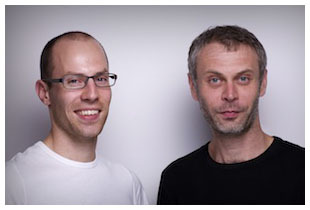 Richard: Mobile is the emerging platform today. We see the future of mobile gaming as new user group. Those are different players – probably do not play on desktop, started gaming with mobile or tablet. A new group of players emerged and it is not nearly satisfied yet. It is exciting to watch as a new generation of gamers is being created. It is an adventure and we love it. A mobile display offers completely different gaming experience than a computer with a mouse. The magic of this new development is to think via the hands of the player. How do I convey the experience through a touch? I do not think that FPS with virtual joysticks will be massively successful gaming experiences. The control is just not natural and it will change with the 3D surface displays.
Richard: Mobile is the emerging platform today. We see the future of mobile gaming as new user group. Those are different players – probably do not play on desktop, started gaming with mobile or tablet. A new group of players emerged and it is not nearly satisfied yet. It is exciting to watch as a new generation of gamers is being created. It is an adventure and we love it. A mobile display offers completely different gaming experience than a computer with a mouse. The magic of this new development is to think via the hands of the player. How do I convey the experience through a touch? I do not think that FPS with virtual joysticks will be massively successful gaming experiences. The control is just not natural and it will change with the 3D surface displays.
Petr: Try to play Cut the Rope with a mouse – it’s only about one third fun compared to cutting ropes with your fingers.
How about your other projects?
Richard: We are working on another title, that is a little more ambitious. It is not a clone, it’s new, absolutely original. It will be a logical arcade but much more dynamic and fun. We’re working on it for six to nine months. We started to code our first demo. We would like to release it approximately at the end of September. We use Unity 3D engine that is becoming very popular. It is easy to port to another platforms, so we’ll go for Android with minimum costs to see what the market will do.
Petr: Our concept is really simple and straightforward. We created it when working on Power of Logic. We are happy we had a lot of time to polish the idea – we often deliberately simplified it.
How much time do you devote to marketing?
Petr: Marketing of games might be more than half of the success. We thought at first that advertising company experience will be beneficial. The competition on App Store is huge, there are over 700 new apps being published daily. We used Power of Logic to test many things, and we just continue experimenting. We are often faced with the simple fact, that not everything from classic advertising business works here. Media play a key role because they can communicate with player masses. We are also more and more convinced about the word of mouth – people will just tell each other about the game. Right now we think a lot about how to make the players spread the game themselves, so that it is more competitive, so that they can easily play against each other. We’re looking for tools to motivate people to this spreading. Forcing it does not work, player’s interest must be natural.
